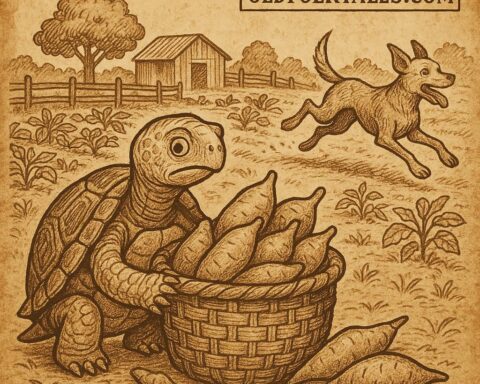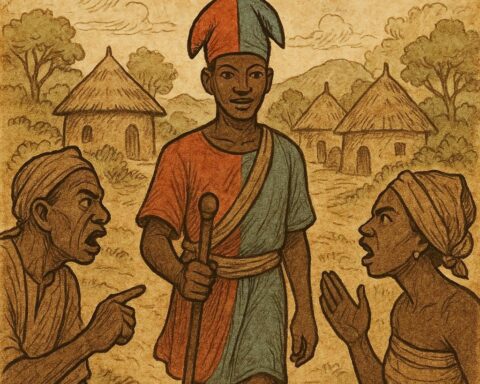In the time when the world was still young and the rivers listened to the voices of the people, there was a proud village called Ayetoro. It stood on rich soil between two gentle hills, and the great Oshun River curved nearby like a silver serpent basking in the sun. The villagers were farmers, fishermen, and potters. Their lives depended on the kindness of Oshun, the river goddess who gave them fertile fields, full nets, and calm waters.
Every year during the festival of Oshun, the people dressed in their finest clothes and gathered at the riverbank. They brought baskets of yam, jars of palm oil, and bowls of honey as offerings. The Arugba, the sacred carrier, would walk barefoot to the edge of the river, singing praises to the goddess. Drums echoed across the water, dancers moved in slow, graceful circles, and the air smelled of roasted yam and flowers. In return for this devotion, Oshun kept the floods away and blessed the people with abundance.
For many years, this covenant remained unbroken. Yet, as Ayetoro grew wealthy, the hearts of its people began to change. A new leader, Chief Adebayo, took power. He was strong and clever, but his pride was heavier than the crown on his head. “Why should we bow to a river?” he asked the elders. “We have strong walls and storehouses filled with grain. We can command our own destiny.”
The oldest man in the village, Baba Olawale, shook his head. “A river never forgets kindness or insult. To mock her is to invite her anger.”
But the chief would not listen. That year, when the festival came, the offering was small and careless. The Arugba carried a nearly empty calabash. The drums beat without spirit, and the dancers moved as if they were tired of tradition. Across the water, the current swirled as though something deep beneath the surface had awakened.
That night, Chief Adebayo dreamed of an old woman. Her skin was the color of wet earth, her hair glistened like black water, and her eyes shone like polished stones. She spoke with a voice that rolled like distant thunder. “You have forgotten me. You have broken the promise,” she said. The chief laughed. “What can you do? My walls are high and my stores are full.” The old woman’s voice grew colder. “A river does not climb walls. It swallows.”
The next morning, the sky was dark and heavy. A sharp, metallic scent filled the air. For three days, rain fell without pause, and the Oshun swelled beyond her banks. The water crept into the fields, covering yam mounds and washing away fishing traps. The villagers watched from the safety of the walls, believing the flood would pass.
On the fourth night, the river roared like a thousand drums. It smashed through the wall in a single rush, tearing down houses and carrying away livestock. Mothers clung to their children, fishermen clung to palm trees, and the sacred drum of the village rolled away into the darkness.
Chief Adebayo tried to flee to the hilltop, but the flood caught him by the ankles. The water was cold and filled with unseen hands pulling him under. In his last breath, he heard the old woman’s voice again. “A river does not forget.”
By sunrise, Ayetoro was gone. Where the market square once stood, a deep, still lake reflected the gray sky. The tops of palm trees swayed like ghosts above the water. Only the two hills remained, crowned with the few survivors who had escaped the flood.
The people left the place in silence. They built their new homes far from the reach of the river, and they told their children never to forget the story. Some nights, when the moon is bright, villagers claim they can hear faint drumming beneath the water, as if the lost people of Ayetoro still dance for Oshun.
Moral Lesson of The River That Swallowed a Village
Pride can blind even the strongest leader, and a broken promise can bring ruin to an entire people. The villagers of Ayetoro learned that nature and the spirits who guard it must be honored, for they hold both the power to give life and the power to take it away. Gratitude and respect keep the world in balance, but neglect and arrogance tip that balance toward destruction. A river’s patience is long, but its memory is longer.
Knowledge Check
1.What is the origin of the story The River That Swallowed a Village?
This tale is rooted in Yoruba oral tradition from southwestern Nigeria, where rivers like Oshun are honored as living deities with power over the land and people.
2.Who was the leader responsible for angering the river goddess in The River That Swallowed a Village?
Chief Adebayo, a proud and ambitious leader, refused to honor the annual festival offerings to Oshun, believing his walls could protect the village.
3.How did the river goddess warn Chief Adebayo in the story The River That Swallowed a Village?
She appeared in his dream as an old woman, warning that a river does not climb walls, it swallows, but the chief ignored her words.
4.What disaster destroyed Ayetoro in The River That Swallowed a Village?
A massive flood caused by heavy rains and the anger of Oshun swept through the village, destroying everything in its path.
5.What is the main lesson of The River That Swallowed a Village?
The story teaches that pride and broken promises can lead to destruction, and that respect for nature and spiritual agreements is essential for survival.
6. Why do the survivors in The River That Swallowed a Village live far from the river now?
They moved away to avoid angering the river again, passing the warning to future generations to honor the river and its goddess.
Cultural Origin: Yoruba people of Southwestern Nigeria






